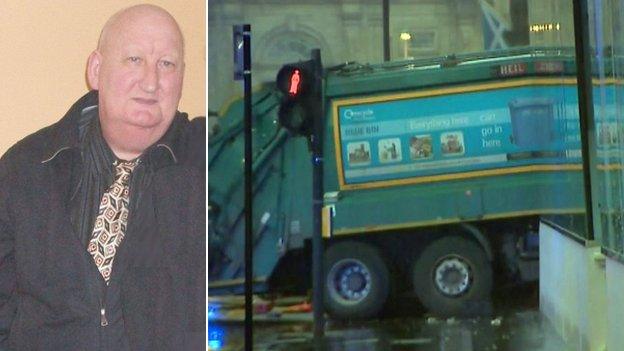Glasgow bin lorry crash inquiry: What does the report tell us?
- Published
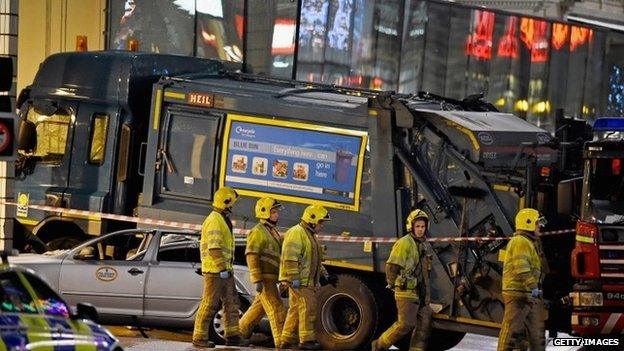
The bin lorry crash took less than 20 seconds to unfold
A sheriff has issued his findings following the fatal accident inquiry into the Glasgow bin lorry crash, which killed six people in December 2014.
Sheriff Beckett's determination is critical in particular of driver Harry Clarke, stating outright that the crash might have been avoided had he not lied about his medical history.
But there are also implications for Glasgow City Council and potentially all local authorities; for doctors and GPs; and for the DVLA and driver licensing right across the UK. It includes appeals to government ministers and could see changes to the law.
As well as eight "reasonable precautions" which could have prevented the crash - all relating to Mr Clarke's health - the sheriff outlined 19 recommendations which could reduce the chances of such an incident recurring in future.
BBC Scotland reporter Philip Sim, who covered the inquiry at Glasgow Sheriff Court, examined the sheriff's determination.

The Crash
Sheriff Beckett's job at the fatal accident inquiry was to establish the basic facts of what happened on 22 December, 2014, and what could be done to prevent such a tragedy happening again.
He ruled that John and Lorraine Sweeney, Erin McQuade, Stephenie Tait, Gillian Ewing and Jacqueline Morton died due to the "loss of control" of a Glasgow City Council bin lorry by driver Harry Clarke.
Mr Clarke lost control after suffering an episode of neurocardiogenic syncope - "he fainted" - and the vehicle mounted the pavement on Queen Street, which was busy with pedestrians and Christmas shoppers.
Inside, crewman Matthew Telford shouted, "you're killing people Harry". Accelerating to speeds of up to 26.09mph, the lorry collided with pedestrians, buildings and cars before crashing into the Millenium Hotel less than 20 seconds later.
-
Jacqueline Morton
×The 51-year-old worked in a tax office in the centre of Glasgow.
It is understood Jaqueline Morton had finished work and was on her way to collect her two grandchildren when she was killed in the bin lorry crash.
She left behind her partner John and two grown-up sons.
-
Stephenie Tait
×Twenty-nine-year-old school teacher Stephenie Tait had been enjoying the build-up to Christmas and had attended a carol service at her local church the night before the tragedy.
During her funeral at the beginning of January, the pupils she taught at St Philomena's Primary School in Glasgow said their goodbyes.
Canon Peter McBride, who led the Requiem Mass, told mourners gathered: 'Stephenie brought order, organisation, good humour and a sense of calm into family life, her teaching career, her parish ministry, and into her friendships.'
-
Gillian Ewing
×Events co-ordinator Gillian Ewing had recently moved to Cyprus but was back in Scotland visiting her family and friends for the festive season.
The 52-year-old mother-of-two was doing what thousands were doing in Glasgow that day - shopping for Christmas gifts.
She died alongside five others when a Glasgow City Council bin lorry careered out of control.
Ms Ewing's funeral took place in Edinburgh on hogmanay, 2014.
-
Erin McQuade
×Glasgow University student Erin McQuade had been enjoying the Christmas break when a bin lorry struck and killed her on 22 December 2014.
When not studying for her degree, the 18-year-old worked for Cameron House Hotel Resort, near Loch Lomond.
Professor Anton Muscatelli, principal and vice-chancellor of Glasgow university, said following Miss McQuade's death: 'The university is deeply saddened to hear that one of our students has been tragically killed in this terrible incident.
'Our thoughts and prayers are with Erin McQuade's family at this dreadfully sad time.'
-
Jack Sweeney
×Pensioner Jack Sweeney was Christmas shopping with his wife Lorraine, daughter Jacqueline and grand-daughter Erin when the tragedy happened.
The 68-year-old from Dumbarton was killed along with Lorraine and Erin.
Mr Sweeney had previously lived in Ontario, in the east of Canada.
He was an avid Celtic supporter and was a one-time president of a Celtic supporters' club in Ontario.
Mr Sweeney had been married to Lorraine for more than 45 years.
His joint funeral Mass was attended by more than 1,000 people.
-
Lorraine Sweeney
×It was three days from Christmas, and Lorraine Sweeney was shopping in the centre of Glasgow with her husband, daughter and grand-daughter.
The 69-year-old died alongside Jack, the man she had married more than 45 years earlier.
Mrs Sweeney's 18-year-old grand-daughter Erin was also killed when the Glasgow City Council bin lorry careered out of control.
The tragedy was witnessed by Mrs Sweeney's daughter, Jacqueline, who had been shopping with her family.
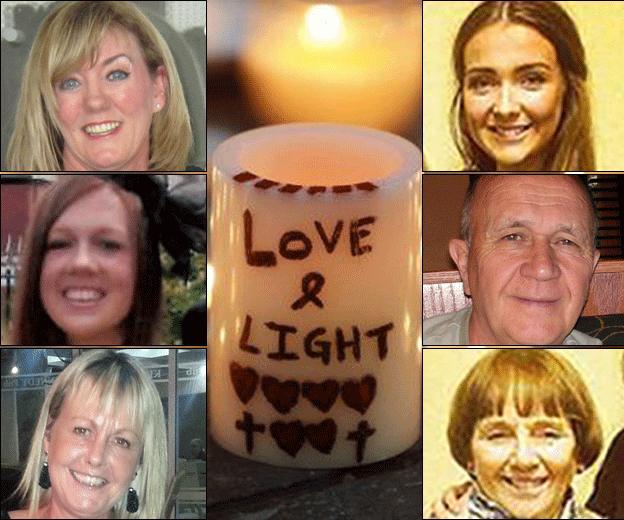
Jacqueline Morton, Stephenie Tait, Gillian Ewing, Erin McQuade, Jack Sweeney and Lorraine Sweeney died in the accident on 22 December 2014

The Driver
The key passages in Sheriff Beckett's determination relate to the bin lorry driver - Henry Campbell Clarke, known as Harry.
The 58-year-old professional driver had appeared normal to colleagues throughout that day, had not been drinking or taking drugs, and medical tests following the crash "revealed no abnormalities" - until a "tilt table" test gave some confirmation of the "already presumed diagnosis", of neurocardiogenic syncope.
It was revealed during the inquiry that Mr Clarke had a history of fainting and dizziness, and had in fact previously suffered a similar episode while at the wheel of a bus, in 2010.
Mr Clarke declined to answer all but a few basic questions when called to the inquiry, for fear of incriminating himself in a potential private prosecution - although he did later issue an apology for the role he played in the crash.
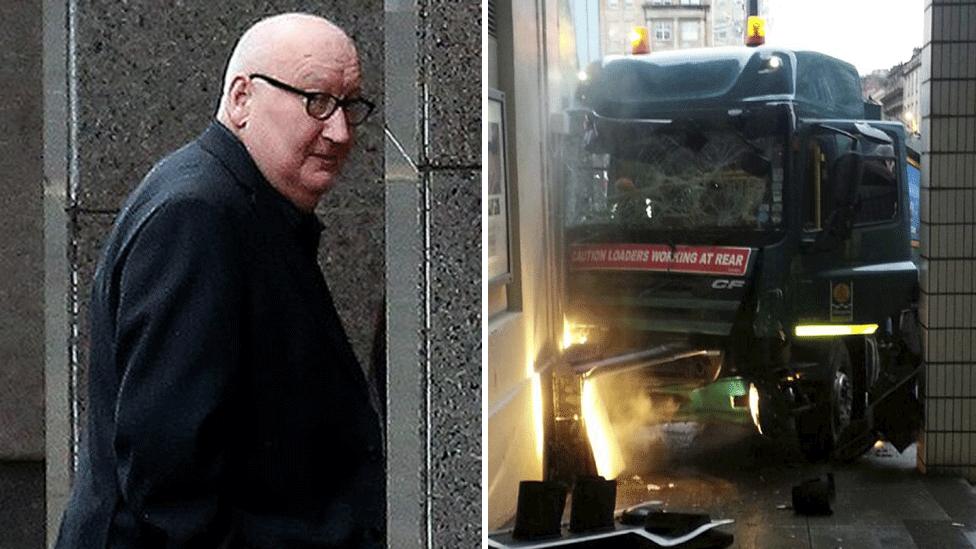
Bin lorry driver Harry Clarke lost consciousness at the wheel before the lorry careered through Queen Street and George Square and crashed into a hotel
Sheriff Beckett's determination was damning of Mr Clarke. He "deliberately misled" and "deceived" his doctors, lied on health declarations and "deliberately concealed relevant information from the DVLA" - potentially a criminal offence.
Of the sheriff's eight "reasonable precautions" which could have prevented the crash, five of them were things Mr Clarke could have done:
He could have told "the whole truth" to doctors about his 2010 faint.
He could have provided "true and accurate information" in health questionnaires when applying for a job with Glasgow City Council in 2010.
He could have disclosed his true medical history in Bupa health questionnaires in 2011.
He could have mentioned his 2010 episode in his DVLA license renewal form or to a doctor in 2011.
Or he could have "refrained from continuing to drive buses" or other heavy vehicles following the 2010 episode.

The Council
The inquiry called a series of witnesses from Glasgow City Council, seeking details of Mr Clarke's employment - and in particular the whereabouts of his references, which could not be found in his file.
Days were spent poring over risk assessment documentation and the specifications of the council's vehicle fleet.
There was much debate of what, if anything, the other crewmen on the bin lorry could have done as it careered out of control, and whether emergency braking systems could be fitted or additional training offered.
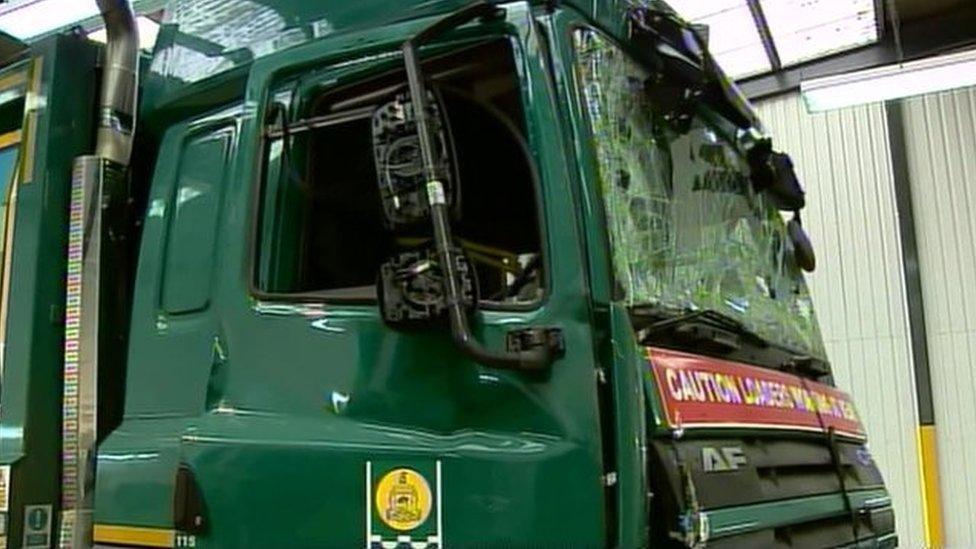
Sheriff Beckett recommended that bin lorries be fitted with automatic emergency braking systems in future
Sheriff Beckett said all councils, and any other organisation collecting refuse, should seek to have automatic emergency braking systems fitted to vehicles old and new, wherever practical.
He also made a number of other recommendations to Glasgow City Council, including:
Do not let drivers start work before references are checked.
Carry out an internal review of employment processes to improve checks on medical and sickness absence information.
Provide crews with "some basic training" about the steering and braking controls of its vehicles.
Map out routes between collection points in risk assessments.
Take into account in risk assessments "the potential for the presence of exceptional numbers of pedestrians at particular times".

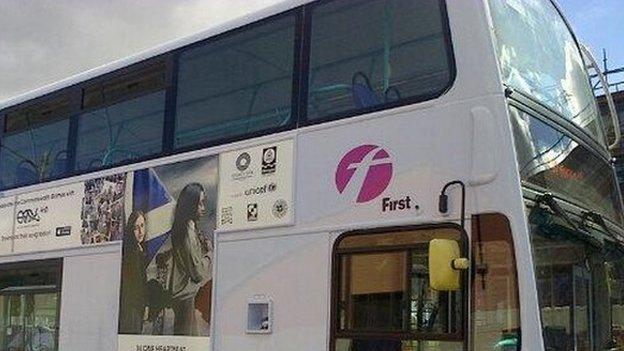
Harry Clarke worked as a bus driver for First Glasgow before moving to Glasgow City Council
The Bus Company
Prior to working for Glasgow City Council, Harry Clarke was employed as a bus driver with First Glasgow.
It was while working there that he suffered a fainting episode at the wheel of a bus in 2010, and he eventually resigned while under suspension.
On the issue of Mr Clarke's missing references, First Bus operations manager Francis McCann insisted he had filled in the forms in full and would have mentioned the 2010 faint.
Sheriff Beckett said he could infer that Glasgow City Council did receive "satisfactory references" for Mr Clarke, but he went on to say that an accurate reference - one mentioning the faint - would not have been satisfactory.
He ruled that had First Glasgow provided "a full, accurate and fair employment reference" to the council, the crash might have been avoided.

The Doctors
One of the biggest revelations of the inquiry was Mr Clarke's lengthy medical history, which showed he had suffered episodes of dizziness and fainting for decades prior to the crash.
Who knew what, and when, became a point of contention in the inquiry, after it emerged Mr Clarke had given different accounts of his 2010 faint to different doctors - he had "deliberately misled" them and "sought to downplay" the incident.
In Sheriff Beckett's view, two of Mr Clarke's doctors might have prevent the crash, had they discussed or picked up on these diverging stories.
First Bus medical advisor Dr Kenneth Lyons could have notified the DVLA of Mr Clarke's 2010 episode just based on the information he was given, the sheriff ruled.
He also said that Mr Clarke's GP, a Dr John Langan, could have clarified the circumstances of the 2010 faint with Dr Lyons before declaring Mr Clarke fit to drive again.
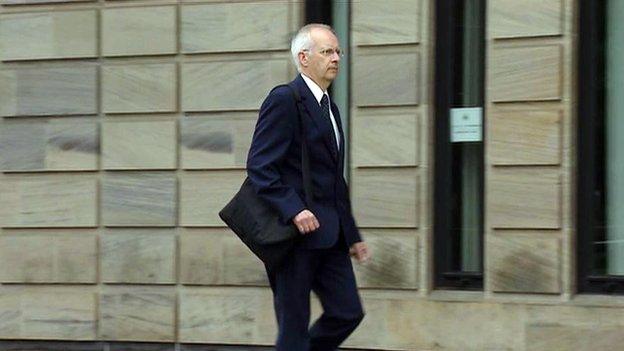
Dr Kenneth Lyons worked for First Bus when Harry Clarke was a bus driver

The DVLA
One document produced time and time again throughout the inquiry was the DVLA's guide for doctors on fitness to drive, which lays out different medical conditions and when the authorities should be notified.
The "at a glance" guide was criticised by a number of witnesses and counsel as being too complicated and too vague in defining different kinds of stroke, and when an episode is severe enough for the DVLA to be notified.
Even the body's own chief medical examiner admitted that leaving drivers to self-declare health issues was a "weakness", which exposed applicants "to a huge level of temptation".
Sheriff Beckett said the licensing authority should reassess "precisely" what the guidelines are meant to mean and achieve, and consider adding a flow chart to help guide doctors to a proper decision. Specifically, he suggested the guide should give more weight to fainting incidents which occur at the wheel, like Mr Clarke's 2010 episode, and any lack of warning signs before a faint.
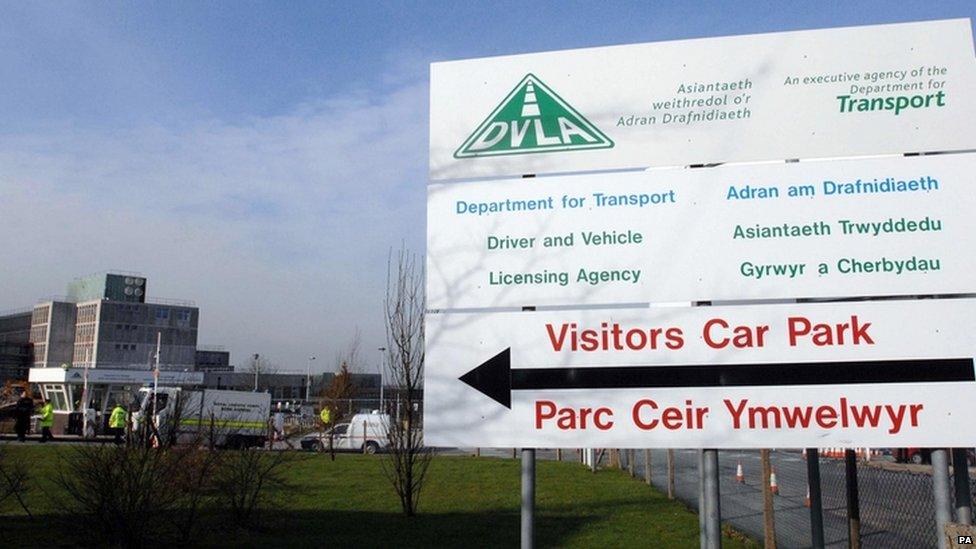
Sheriff Beckett made a number of recommendations for the DVLA
In a move which could have an impact right across the UK, Sheriff Beckett said the Secretary of State for Transport should hold consultations on changes to the driver licensing system.
He said harsher penalties should be considered for non-disclosure of health issues to the DVLA, or a change to the method of prosecution - the inquiry heard that nobody in Scotland had ever been prosecuted by the body for making a false declaration.
He also said there should be a consultation on giving doctors more freedom, or even an obligation, to report concerns about a patient's fitness to drive directly to the authorities, in spite of patient confidentiality.
The DVLA has said it is "carefully considering" the recommendations.

The Families
Finally, Sheriff Beckett had some words for the families of those killed in the bin lorry crash, many of whom came to Glasgow Sheriff Court day after day to hear evidence in the inquiry.
Some have voiced anger at the Crown's decision not to charge Mr Clarke with a crime, and announced during the inquiry that they intended to seek a private prosecution.
Sheriff Beckett said it "cannot have been easy" for the families to come and hear evidence the inquiry, and said he could understand why others kept in touch with its progress from a distance.
He said they had demonstrated "love, loyalty and commitment" for those they had lost, and "managed to maintain composure, dignity and respect in circumstances which must at times have been very difficult indeed".
- Published13 November 2015
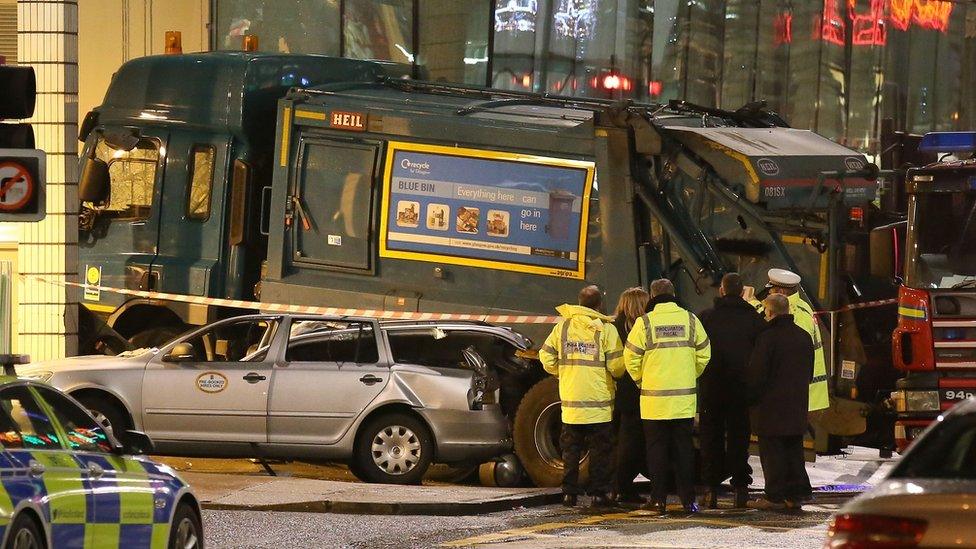
- Published3 November 2015

- Published28 August 2015
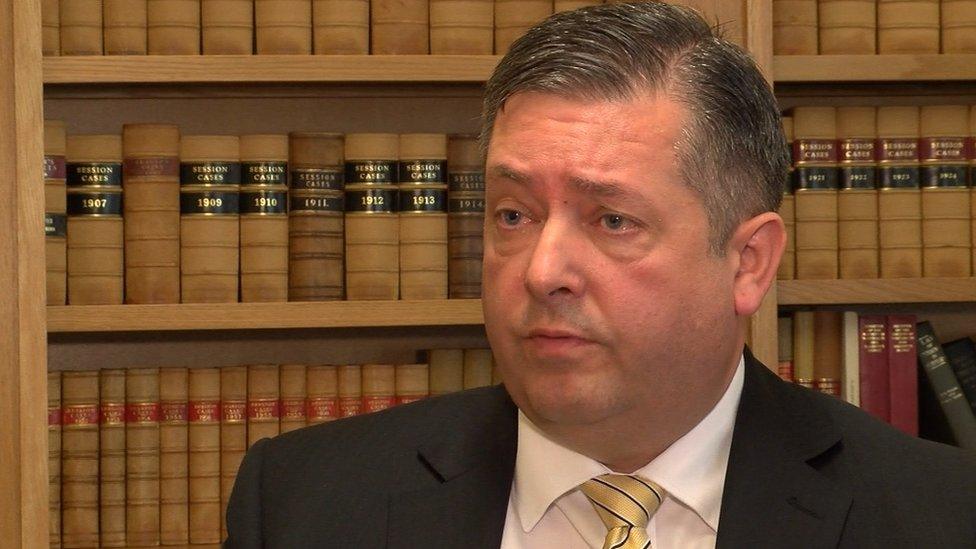
- Published28 August 2015
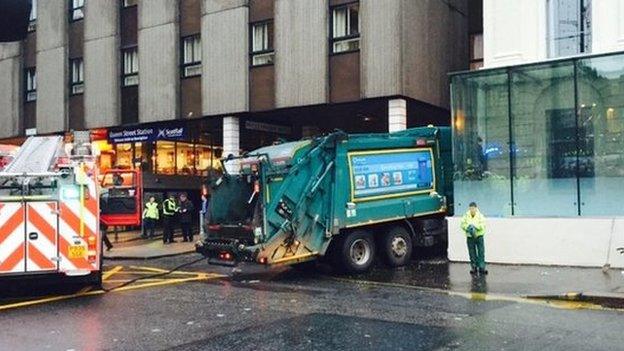
- Published17 August 2015
